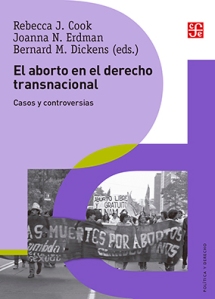Congratulations to Dipika Jain and Payal Shah, whose 2020 article recently appeared in the Columbia Journal of Gender and Law. Dipika Jain is a Professor of Law and Executive Director of the Centre for Health Law, Ethics, and Technology at Jindal Global Law School. Payal K. Shah, recently acting as Regional Director for Asia at the Center for Reproductive Rights, is now a Reproductive Health Law Fellow in the International Reproductive and Sexual Health Law Program at the University of Toronto’s Faculty of Law. We are pleased to circulate the authors’ abstract and a link to their paper:
“Reimagining Reproductive Rights Jurisprudence in India: Reflections on the Recent Decisions on Privacy and Gender Equality from the Supreme Court of India,” by Dipika Jain and Payal K. Shah. Columbia Journal of Gender and Law 39.2 (2020): 1-53. Abstract and article online.
Despite the significant impact of decisions around pregnancy, including abortion, on a woman’s future life and enjoyment of her other human rights, the Indian judiciary has yet to clearly articulate the link between reproductive autonomy and gender equality. In the Puttaswamy decision, the Supreme Court’s recognition of the right to reproductive choice is rooted within the constitutionally protected right to privacy. While the right to privacy has been the basis for ground-breaking judgments on reproductive rights globally, feminist legal theorists have voiced significant critiques as to the limits of privacy, specifically its potential to achieve reproductive autonomy and equality. We explore the applicability of these critiques in India, including concerns voiced by legal scholars regarding the limitations of the right to privacy as a tool for meaningful enjoyment of reproductive autonomy or gender equality as a whole.
The post-Puttaswamy decisions of Navtej Johar [on homosexuality] and Joseph Shine [on adultery] mark a shift in jurisprudence, with the Supreme Court relying on equality-based arguments to reject societal stigmatization and discrimination against the marginalized group in question. In both cases, the court set forth a framework to understand how the rights to privacy, equality, and non-discrimination on the basis of sex and gender intersect. This intersection of rights gives rise to an obligation of states to eliminate laws that reflect discriminatory gender stereotypes, including those pertaining to sexuality. Limits on the right to abortion indirectly or directly marginalize women by controlling their right to bodily autonomy and denying them privacy and equality. Hence, we argue that these cases demonstrate the potential success of arguments for reproductive rights based on equal citizenship.
We first lay out the legal framework and jurisprudence of reproductive rights in India before the Puttaswamy decision. We then explore the benefits of having a constitutionally recognized right to privacy and how it can advance reproductive rights. We also examine the drawbacks of using a privacy-based analysis as a foundation for reproductive rights due to its vulnerability to restriction on grounds of compelling state interest. Further, this we engage with feminist critiques of privacy rights as well as equality-based approaches and argue for a framework that takes into consideration meaningful choice and structural barriers to the exercise of reproductive autonomy. We critically examine judgments from comparative and international law that have a strong basis in the right to equality to reflect on how recognition of reproductive rights as an issue of gender justice—beyond just individual choice—could strengthen Indian reproductive rights jurisprudence. In other words, we argue for a reimagination of reproductive rights within an equality framework. Finally, we conclude that the use of an equality-based framework could significantly benefit pregnant persons’ right to reproductive autonomy.
The full text can be freely downloaded through this webpage.]
RELATED REPORTS by Payal K. Shah:
Securing Reproductive Justice in India: A Casebook, Center for Reproductive Rights, 2019 (co-authored with Mrinal Satish and Aparna Chandra) 520-page casebook, and chapters by topic.
Ensuring Reproductive Rights: Reform to Address Women’s and Girls’ Need for Abortion After 20 Weeks in India, Center for Reproductive Rights, 2018. 56-page report.
Reproductive Rights in Indian Courts, Center for Reproductive Rights, 2016. 4-page briefing.
______________
Compiled by: the International Reproductive and Sexual Health Law Program, reprohealth*law at utoronto.ca. See Program website for our Publications, Information Resources, and Reprohealthlaw Commentaries Series. TO JOIN THE REPROHEALTHLAW BLOG: enter your email address in the upper right corner of our blog, then check your email to confirm the subscription.



 Posted by reprohealthlaw
Posted by reprohealthlaw 



